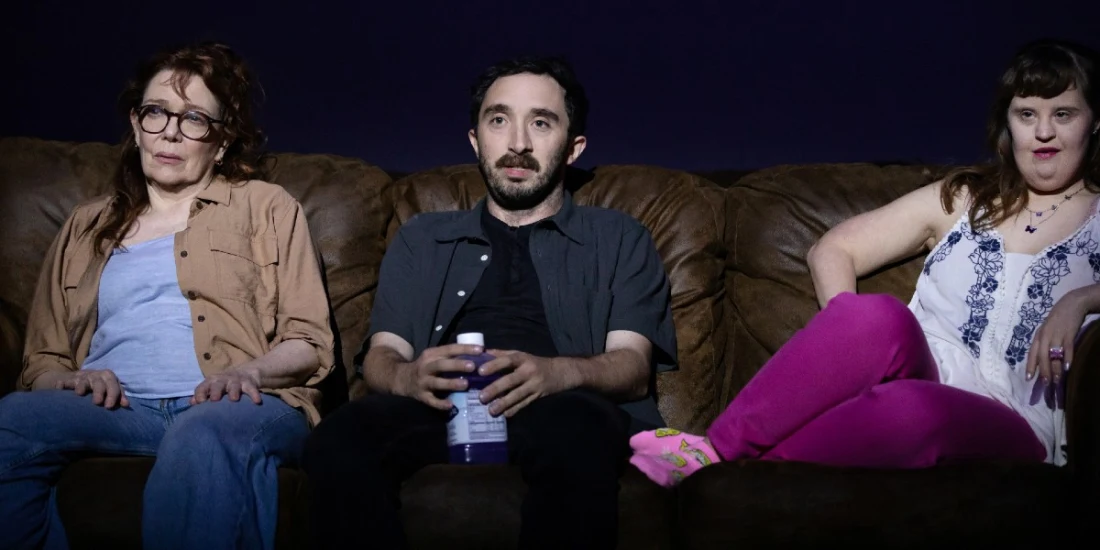'Corsicana' review — in heartfelt new play, 'a song is a family'
In the program note for his new play, Corsicana, playwright Will Arbery writes that he wanted to only write, "Corsicana is a small city in Texas. This play is about four people who live there." In that spirit, I'll summarize his show just as simply: An adult brother and sister have lost their mother. Through a family friend, the brother connects his sister with a local artist/songwriter, hoping them writing a song together will help her cope.
The minimal plot leaves room for a delicate character study of four broken people learning to let others in, despite not being sure if they want to. Arbery, having based Corsicana loosely on his own Txas upbringing and relationship with his sister, has written this flawed but endearing quartet deeply and compassionately, and the cast give uniformly lived-in, gorgeous performances.
The brother, Christopher, is the stand-in for Arbery himself, and Will Dagger plays him earnestly. Though he's devoted to helping his sister overcome her grief, he's dealing with sorrow of his own, and it's touching to see him gradually open up to the aforementioned family friend, Justice (a motherly Deirdre O'Connell). Dagger also has a spot-on sibling dynamic with Jamie Brewer as Ginny, as they jump from tender moments to fights on a dime.
They share a subtle resentment at still living together in Corsicana, an arrangment necessitated by Ginny's Down syndrome. Similarly to Brewer's last Off-Broadway role, though (the title role of Amy and the Orphans), Ginny is far from helpless: she articulates her dreams and desires with confidence. When she says she'll make it out to L.A. and live with Zac Efron, you unequivocally root for her. At the same time, when she declares things like, "people need to know that I'm a good person," you're sympathetic that she, too, knows things aren't easy for her.
In the present, it's especially difficult for her to connect with the artist Lot, a man with a master's degree who claims to have proved the existence of God with experimental math, but threw it away and turned to art because "it's a better delivery system" for, supposedly, the divine. He doesn't know what to make of Ginny's frankness, especially when she says things that remind him of bad memories. Similarly, she doesn't know what to make of him. It's easy for the rough character to be unreachable by the audience, but Harold Surratt gives him softness. When he disappears for most of Act 2, he's missed.
Finally, O'Connell holds the group together as the human embodiment of a warm hug. Fresh off a Tony win for Dana H. on Broadway, she's back thriving in her Off-Broadway niche. She shines especially in Act 2 as she finally expresses her own desires after stepping back to support Christopher, Ginny, and Lot for most of the play, and in one particularly sweet scene, stumbles through a flirtation with Lot.
She also gets a clever monologue in which she describes a piece of writing she's working on, about, in part, "the belief that when a part of the self is given away, is surrendered to the needs of a particular time, in a particular place, then community forms." Keen audiences will recognize she's essentially describing Corsicana itself. It's a testament to O'Connell's performance, Arbery's writing, and Sam Gold's minimal direction that this moment doesn't feel forced.
A few other monologues in Corsicana go overlong, making you feel its 2.5-hour run time. But that's truly its only flaw. For anyone who appreciates a found family trope and wants to see it delivered naturally, humanely, and beautifully, Corsicana provides enough heart to fill the entire state of Texas. When you hear the song they create, which they vow "no one's ever gonna hear," you'll feel like a part of the family, too.
Photo credit: Deirdre O'Connell, Will Dagger, and Jamie Brewer in Corsicana. (Photo by Julieta Cervantes)
Originally published on
